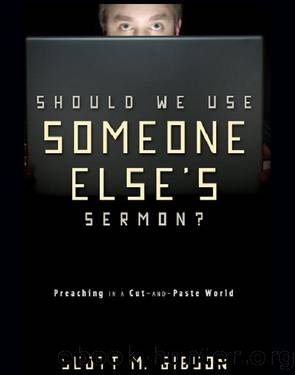Should We Use Someone Else's Sermon? by Scott M. Gibson

Author:Scott M. Gibson
Language: eng
Format: epub
Tags: Array
Publisher: Zondervan
Give Credit
âFew congregations will think less of a minister who frankly states that the outline of a sermon was adapted from Wesley, or one of the major points from Spurgeon,â said Webb Garrison in 1952. âFailure to make such acknowledgement is a way of claiming complete originality. And when a supposedly original sermon is found in a book, the minister does indeed descend in the estimation of his people.â40
What was true in the 1950s is true today. Haddon Robinson observes,
When we make someone elseâs ideas our own, the line between what is âoriginalâ (nothing is truly original) and what is plagiarized is difficult to discern. But clearly if we take most of our material for a sermon from another preacher, then it is a matter of honesty and integrity that we give credit. . . . When we use someone elseâs sermon outline, one way we can easily give credit is âI came across an approach to a sermon by so-and-so, and I want to share it with you.â41
Eugene L. Lowry agrees, âWhen the preacher has borrowed the gist of the textâs meaning or a decisive sermonic turn from anotherâs work, it is easy to note this in the bulletin: âI am indebted to my colleague the Rev. Neighbor for this helpful insight regarding todayâs sermonic themeâ; or âThanks goes to Dr. Homiletician for clarifying the gospel lesson for today.â Alternately, the preacher might acknowledge anotherâs assistance just before the reading of the biblical text, or at some other time in the service prior to the sermon.â42
Oral footnoting can sound clunky. Am I required to say, âBrothers and sisters, this next thought comes from Richard Pervo, who in a 1997 article published in the Journal of Biblical Literature writesâ? I agree with Mike Graves in saying, âNo, thanks!â43
Baptist preacher John Broadus advises, âAvoid a parade of honesty about acknowledging.â44 Preachers would agree with Jamie Buckingham when he states, âMost speakers hate to break the flow in the middle of a message. Itâs much easier to keep going than to confuse the hearer with a score of footnotes plugged into the actual text. . . . But courtesy calls for gratefulness â as long as it can be given without distraction.â45
If a preacher shaped the sermon along the lines of someone else, he can give credit in the bulletin instead of a verbal acknowledgment, especially if an outline or additional material for the sermon is published regularly.
There are always nagging questions when preachers prepare sermons. âI came up with this insight into the text on my own, but then I read the same thing later in Stott. Should I give him credit?â You probably donât have to, but citing Stott would certainly bolster your argument, showing that you think the same on this matter as a leading theologian.
Suppose your big idea is worded the same as, say, a sentence you read in one of Kent Hughesâs books. Do you say where you got it from? Again, itâs not going to clog
Download
This site does not store any files on its server. We only index and link to content provided by other sites. Please contact the content providers to delete copyright contents if any and email us, we'll remove relevant links or contents immediately.
Fangirl by Rainbow Rowell(9220)
How to Bang a Billionaire by Alexis Hall(8132)
Wonder by R. J. Palacio(8092)
The Space Between by Michelle L. Teichman(6920)
The Thirst by Nesbo Jo(6918)
Assassin’s Fate by Robin Hobb(6191)
Wiseguy by Nicholas Pileggi(5757)
The Night Circus by Erin Morgenstern(5203)
Paper Towns by Green John(5168)
The Kite Runner by Khaled Hosseini(5159)
Bittersweet (True North #1) by Sarina Bowen(4836)
Gerald's Game by Stephen King(4630)
Too Much and Not the Mood by Durga Chew-Bose(4324)
Pillow Thoughts by Courtney Peppernell(4265)
Goodbye Paradise(3794)
Twelve Days of Christmas by Debbie Macomber(3548)
Good by S. Walden(3541)
The Rosie Effect by Graeme Simsion(3451)
The Cellar by Natasha Preston(3326)
